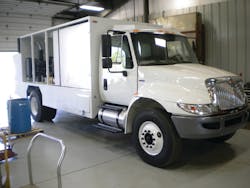Premier Takes Control Of Repairs
We didn’t expect a manufacturer of deicing trucks to tell us that last winter, mild if barely there in most parts of the country, was actually good for his business.
For Premier Engineering & Manufacturing, Marinette, WI, however, last winter marked the first deicing season the company went the extra step to service its large Southwest Airlines account with 24/7/365 service within an hour of a call.
“It was a little daunting considering we’re a small company,” says Jerry Derusha, president of sales. “Luckily, the mild winter gave us an opportunity to get the service off to a good start.”
Derusha took us for a tour of his 23,000 sq. ft. production facility located about 50 miles north of Green Bay, WI. His crews were busy welding torsion bars, twisting tubing for fluid heaters and fabricating the cabinets that would hold the guts of the truck’s deicing machinery.
Another part of the plant held the paint booth and fabrication station for the enclosures to the lifts. The finished trucks are prepped for delivery in a final section in the back of the building.
In its best year, the company turned out 134 trucks. But Derusha will gladly take 75 trucks a year, which keeps quality and profits humming along.
The company also offers after-market service to keep its workforce sharp throughout the year. During our visit, for example, employees were starting to refurbish the first of what could be more than 90 United Airlines’ deicer trucks in service almost as long as Premier’s been in business.
“About five months of the year, the place is the right size,” he says. “For four months, it’s oversized and for three months, we could real use the extra space,” he says.
Derusha started the company in 1991 to service existing deicers, primarily the 500 trucks he helped get out the door at a former employer. But Derusha also started manufacturing his own line of trailer deicers shortly opening the doors, and assuredly re-entered the new deicer truck business when he sold 64 units to United Airlines in 1996.
3 YEARS, 1 HOUR
Derusha knew he had to offer something different so his trucks come with a full three-year warranty that covers parts and labor.
“That is a bumper-to-bumper, top-to-bottom warranty,” he adds. “If even a light goes out, we give you a new one.
Plus, Derusha backed up his service by guaranteeing that a trained service professional would start making repairs within one hour, 24 hours a day, seven days a week and 365 days a year.
“Three years can be a very long time,” Derusha explains. “With 85 percent of our components off the shelf, we went to our suppliers to help us back up the warranty and that one-hour promise.”
That helped the company build a dependable network of techs who knew every mechanical component of the truck. More importantly, it helped the company know how to diagnose a mechanical problem properly over the phone no matter the time of day (or night).
That skill came in particularly handy after the company won a multiyear contract to supply Southwest Airlines with deicers at 63 locations around the country. Currently, the airline operates about 175 Premier deicers.
Anything mechanical is bound to have issues. Premier offered, however, a better way to resolve those issues – and along the way won the recognition of the airline’s GSE department by winning its Equipment Provider of the Year award.
Beforehand, here’s the airline’s protocol for managing repairs. The operator would notify the station manager; the station manager would notify his supervisor – who likely was located in another zip code and time zone – and then one of the airline’s subcontractors would roll out to fix the problem.
That sounds like a problem to fix a problem. And there’s nothing worse if you’re Derusha, who’s poured all his energy into his company and its products, and told your trucks don’t work.
“We said to Southwest, if one of our trucks doesn’t work, you call us directly and we’ll take care of it,” Derusha says.
Although the company’s 24-hour service pledge wasn’t new, past a certain hour the calls became went to a pager and a cell phone. Now, callers reach a real person can triage the emergency calls from what might wait until morning.
If it’s an emergency, Derusha talks directly with the operator to identify what the real problem might be. Nothing against the operators, but Derusha says the operator knows just as much as the typical driver knows about a car. Operator error can’t be ruled out as the cause of “mechanical” problems, particularly with a new vehicle.
“In that case, the operator can get the truck operating again after he realizes the honest mistake he made,” Derusha says.
When the problem is indeed a mechanical failure, Derusha has access to the list of all of the airline’s subcontractors – typically ground handlers who have personnel stationed right at the airport – who are cleared to make the repairs. Warranty or not, the bills all go to Premier first for review.
As part of the new service plan, Premier also has access to the airline’s central database for equipment and can input the repairs made.
MORE HELP
Premier’s three-year warranty was unheard of when Derusha originally put it place in the early days of his business. He says some of his competitors have since added another year to their typical one-year warranties. The company also offers other help to all its accounts:
- Summer Inspections: While under warranty, Premier provides two annual inspections to each unit during the summer months for warranty inspections, and will replace worn components prior to the upcoming season at no charge.
The summer work is vital. Deicer trucks have to work in the worst weather, but may only be called on to operate around 20 times a year.
“The rest of the time the truck just sits – and that’s the worst thing you can do to a mechanical piece of equipment,” Derusha says.
Disuse invites “operators” of a different kind, such as mice moving into the engine or birds nesting in the lift. Derusha’s No. 1 summer maintenance tip: Start the engine at least once a month.
Also, Premier will train or retrain any personnel during the warranty check-up.
- Spare Parts: New trucks leave Premier with a box of spare parts, such as a blower motor, fuel pump or temperature switch, on board.
That way, subcontractors always have the parts they need for the usual repairs, and Premier saves considerably on shipping those parts next-day air. Premier owns the parts and won’t bill for their use until installed. And if a subcontractor decides to keep a box of unused parts after the warranty ends to keep on hand, Premier will bill what the parts cost three years before delivery rather than the current price.
- Delivery Service: Anyone who delivers a Premier truck is also qualified to train the operators, too. All delivered vehicles are also given a thorough inspection since a thousand-mile trip isn’t out of the ordinary.
About the only extra service Premier says a firm no to is offering advice on spraying glycol. That one he’s happy to leave up to the airlines and regulators.
Equipment Provider Honors
Southwest Airlines’ GSE department named Premier Engineering & Manufacturing its Equipment Provider of the Year for 2011 as a result of the direct service procedures the company started overseeing last year for its deicer trucks.
The award started in 2007 as an expansion of the GSE department's employee recognition program. The entire GSE staff nominates and then selects the winner based on the following:
- Customer support and services.
- Equipment reliability.
- On-time deliveries.
- Parts support.
- Product quality.
- Providing an excellent value.
- Training.
- Warranty program and support.
“I almost couldn't get my head on the plane when I was flying back," Jerry Derusha, Premier's president of sales, told us shortly after receiving the award. "We are very proud of the confidence that Southwest has put in Premier.”

